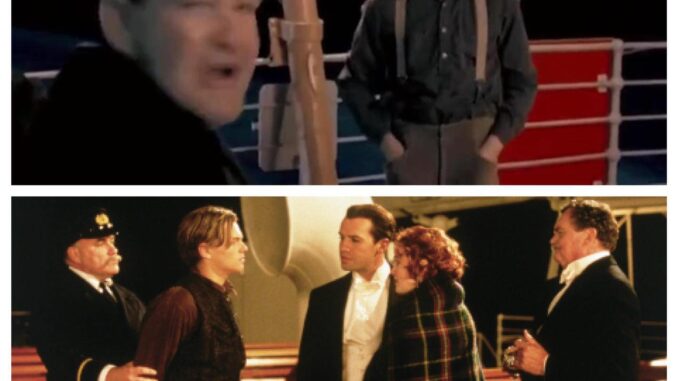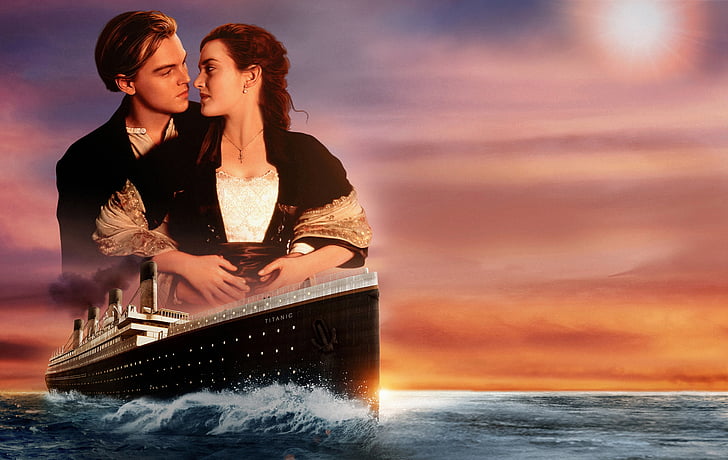
While James Cameron’s Avatar: The Way of Water has passed Titanic on the list of all-time top-grossing movies, his 1997 Oscar-winner recently got a boost from a 25th-anniversary theatrical rerelease that played to sold-out theaters and earned the film another $50 million worldwide. It’s a testimony to the power of Titanic’s central love story and disaster movie thrills that even with the movie readily available for home viewing, fans are still willing to go see it again in theaters.

But one thing they won’t get in theaters is a chance to see the alternate ending of Titanic, a longer and more detailed cut that Cameron ultimately trimmed down to the minimalist version in the theatrical edit. Many argue Cameron made the right choice, and avoided sinking the movie’s final emotional beat. But are the audiences lining up to see Titanic again actually missing out?
At Polygon, we’re split. So we’re here to present our evidence and decide: Is the alternate ending of Titanic better than the original?
OPENING STATEMENTS: TITANIC’S ENDING, MOMENTARILY EXPLAINED
Tasha: Let’s start with a quick rundown on the two versions we’re debating here. James Cameron frames Titanic as a treasure hunt, where in 1996, salvager Brock Lovett (Bill Paxton) and his crew are searching for “the Heart of the Ocean,” a massive blue diamond built into a necklace that supposedly went down with the Titanic. After finding a drawing of a nude woman wearing the Heart of the Ocean in the Titanic safe where they expected to find the diamond, they track down the subject of the painting, elderly socialite Rose (Gloria Stuart), to fill them in on her time on the Titanic in 1912 (when she was played by Kate Winslet).
/cdn.vox-cdn.com/uploads/chorus_image/image/72012470/Titanic_2108.0.jpeg)
In the theatrical ending, 1996 Rose slips out of bed after the story is over and quietly pulls the Heart of the Ocean out of her pocket and throws it into the sea. She had it all along as a keepsake of her doomed romance with young pauper Jack (Leonardo DiCaprio), and didn’t tell Brock, his crew, or her adult granddaughter Lizzy (Suzy Amis), who’s also on the salvage boat. Then she goes back to bed and dreams of 1912. (Or maybe dies, and reunites with Jack? That’s my interpretation for sure, but some people definitely see it differently.)
In the longer original ending, Brock and Lizzy see her on deck and think she’s about to kill herself by jumping overboard. They confront her and see she has the necklace, and she lets Brock touch it and understand he’s never going to own it before she tosses it into the water. Otherwise, the ending is much the same. Does that sum up everything we need to know?
Patches: Let me stress the tonal difference of these two scenes: Backed by James Horner’s ethereal score, then a reprise of the classic theme, the official ending to Titanic plays out as a moment of quiet closure. The alternate ending is kind of like a Super Bowl commercial parody of the actual ending, where Old Rose is suddenly played by the rapping grandma from The Wedding Singer.
PRESENTATION OF EVIDENCE: WHICH TITANIC IS BETTER?
Tasha, the case for Titanic’s alt ending: I get why Cameron went with the simpler version: It puts the emphasis on Rose and her emotions, and on the 1912 love story that makes this movie what it is. You don’t have to worry about anybody else’s feelings about chucking that diamond, and what it costs everyone else on that boat. But that leaves everybody else’s story unresolved! Poor Brock might just spend the rest of his life looking for a necklace he’s never going to find, while Rose just silently smirks about it! (Or, y’know, dies on his boat.) Do you just not care about anyone else’s feelings here?
Patches, the case for Titanic’s original ending: If Brock spent three hours listening to Rose tell her story only to go back on the hunt for the Heart of the Ocean, then the man deserves the cloud of failure that comes with a Sisyphean task. Brock sucks! He’s charming enough in the movie, because Bill Paxton was a god among men.
:no_upscale()/cdn.vox-cdn.com/uploads/chorus_asset/file/24458038/Titanic_2087.jpeg)
But on some level, he’s the anti-Cameron. Devout Cameron-watchers know he’s spent unimaginable amounts of money and time building deep-sea submersibles just for the thrill of going where no man has gone before — or in the case of his actual Titanic wreckage dives, to feel the ghosts of the past. Brock just wants money. Cameron describes him in Titanic’s screenplay as “a wiley [sic], fast-talking treasure hunter, a salvage superstar who is part historian, part adventurer and part vacuum cleaner salesman.” Emphasis on vacuum cleaner salesman — the guy is all hot air. I do not care about his feelings, and Rose is right to keep him in the dark about the Heart of the Ocean.
